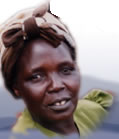THEMES IN THIS
TESTIMONY
Agriculture

Communications

Culture and Customs

Development

Family Life

Gender

Health

Click on arrows
to find more
testimonies
featuring
these themes
|
Dina and Margaret |
(KENYA 2) |
|
Sex
|
Female
|
|
|
Age
|
42
|
|
|
Identity
|
Teso
|
|
|
Occupation
|
Dispossessed farmers
|
|
|
Location
|
n/a
|
|
|
Date
|
November 1996
|
|
summary
This interview was conducted with co-wives Dina and Margaret. Unfortunately there is no indication of who is speaking when, though Margaret apparently dominated the interview.
The interview provides a vivid account of the problems inflicted on a woman and her family by the ethnic conflict in Mount Elgon, followed by some interesting discussion on her own values and those of her society. The interview as a whole is somewhat varied in quality, with lots of very short answers, but yielding some good quotes. There are some confusing passages, and parts where the narrator either doesn’t answer the question or repeats her obvious distress at having lost her possessions and not having enough food or money. But there are many sharp and revealing answers.
The narrator is a Teso, who was a successful farmer with her co-wife, until tribal clashes resulted in their property being burnt and their cattle stolen. Much of the interview concerns her reflections on what they had then and have now, and how difficult life is currently. “If you could go to my house during the harvest, there were so many sacks all over, we had to push all chairs against the wall. At the moment we have nothing at all, we are now ourselves.”
The content is wide-ranging. She provides a clear account of the importance attached to circumcision, which includes stories of people being forced to undergo it. “There was another man who was against them circumcising his own wife and was beaten badly until he was admitted in the hospital, while the wife proceeded to the operation that very day…Circumcision is one of our traditions and we have to practice and sustain it. The practice has been taken as a must and whenever one does it, the other candidates will start longing for it until they are operated on.” The narrator also describes the suspicion which exists towards modern family planning methods: “What we know, is that the modern family planning methods are the major causes of diseases.”
She describes the difference between men and women’s work and roles. “…moran (men) don't have a lot of work…We appreciate them because of the protection they offer us in so many matters but the rest of the work is left to us.” Having not had an education she is very keen for her own children to, especially the girls whom she sees as more reliable.
detailed breakdown
|
You will need a password from Panos to view the full
transcript of the interview. To apply for a password, click here.
Once you have a password, click here to go to the beginning
of the transcript. You can also click on any section of the
breakdown of content below and go straight to the
corresponding part of the transcript.
|
| Section 1 |
Memories of childhood and of sneaking out as a teenager to go to dances.
|
| Section 2-3 |
Problems caused by the conflict - loss of property and possessions. Describes in detail the destruction of her property by the attackers, and the stress and fear in the aftermath. “We have nothing to eat, no soap, and even clothing is a major problem…I am very much afraid when I hear people saying that the same things are going to happen again.”
|
| Section 3-4 |
Believes her neighbours carried out the attacks, because of their hostility towards Teso, and because of a general Sabaot strategy of ridding the area of all non-Sabaot whom they term “foreigners”. Other ethnic groups such as the Bukusu were also attacked.
|
| Section 5-6 |
Life as a refugee in Kamsinga.
Considers the differences between the prosperity of the past and poverty of the present.
Psychological and practical effect of being dependant on others: “If you depend on others you lack both life direction and strength.”
|
| Section 5-8 |
Describes the effects of poverty on her life.
|
| Section 6 |
Lack of money means land cannot be farmed.
|
| Section 7 |
Problems in receiving payment for coffee.
Lack of school fees. Regards this as the only reason for school dropouts.
|
| Section 8 |
Talks of the temptation to steal to alleviate her poverty.
Reflects on how life during her youth was better. Describes how different ethnic groups got along - less spirit of mutual help nowadays.
|
| Section 9 |
Describes circumcision ceremony. Significance of circumcision for the people. Belief that an uncircumcised woman could not bear children.
|
| Section 10 |
Instances of forceful circumcision and intimidation of those who protest.
|
| Section 10-11 |
Increase in responsibility and respect afforded to the circumcised, but not to those who cry. “A person who is circumcised is highly respected and seen as an old person even if he or she is your age mate. The uncircumcised is still seen as a child.”
|
| Section 11 |
Compares unfavourably the modern fashion for elopement with the old traditions of marriage and proposal. When a girl elopes, her parents are unable to fulfil their traditional duties of support in times of trouble.
|
| Section 12-13 |
Discusses the division of labour: men do little work, women work from sunset till sundown. Yet she and her co-wife had a lot of financial independence - could sell their produce whenever they wanted and keep the money.
|
| Section 14 |
Past division of labour and merry-go-rounds.
|
| Section 15 |
Transporting goods to the market place.
The past and present dangers of Mount Elgon (attacks and wild animals)
|
| Section 16 |
Causes of under development in Mt.Elgon - tribalism.
Need for government to develop roads and bridges.
Difficulty of supporting a large family.
|
| Section 17 |
Family planning - regards modern methods as “cheating”. Traditional methods seen as superior; modern methods cause disease.
|
| Section 18 |
Preference for delivering children at home rather than in the hospital: “Even if the hospital is termed as clean, I know there are some things they do clumsily and carelessly.”
|
| Section 18-19 |
Changing attitudes to education of girls: “An educated girl will always remember when her parents are in problems”.
|
| Section 19 |
What a girl or boy must do to be seen as an adult - put in material terms.
Role of women - respect for husband and relations and carrying out of household tasks. |
|


